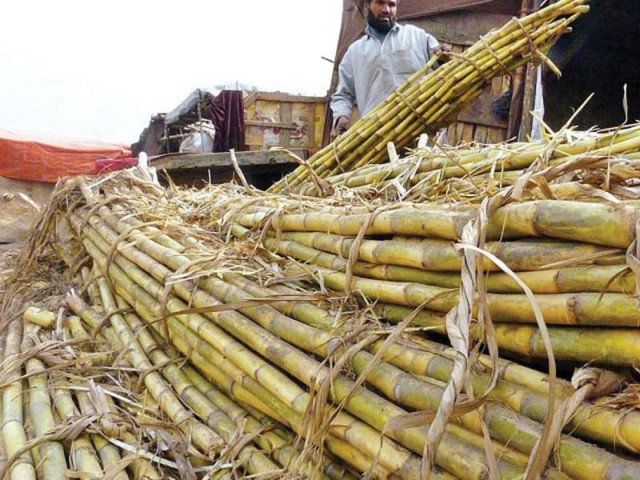Cabinet fixes wheat, sugarcane prices
Mulls capital punishment, life sentence for drug offences

To avoid spending money on costly imported wheat, the Sindh cabinet on Thursday decided to encourage local growers to cultivate more wheat by fixing the minimum procurement support price at Rs2,000 per 40 kilogrammes. With the sowing season just around the corner, the rates will be implemented with effect from the next harvest season.
The cabinet meeting, chaired by Sindh Chief Minister Syed Murad Ali Shah at the CM House, also approved the sugarcane support price at Rs202 per 40kg. The cane crushing season is to begin in November.
With the looming threat of another flour crisis, the cabinet members were united about the need to fix the wheat support price to encourage local farmers for greater production.
Briefing the media about the decision, Sindh government spokesperson Murtaza Wahab said the Sindh government would propose this support price to the Centre as well. Lashing out at the Pakistan Tehreek-e-Insaf-led federal government for failing to provide relief to the masses, he alleged, “The price for 1kg of sugar has jumped from Rs52 to Rs110 in the last two years. This was done to appease the sugar cartel sitting in the federal government’s rank and file.”
Officials informed the cabinet that wheat recently imported from Ukraine had finally reached Sindh at the price of around Rs5,000 per 40kg, despite being of lower quality than the wheat grown here.
It was pointed out that the country was spending foreign reserves on importing wheat while failing to incentivise farmers to grow more wheat for consumption and export.
Officials from the provincial agriculture department told the cabinet that both Punjab and Balochistan had proposed a wheat procurement support price of Rs1,700 per 40kg, while Khyber-Pakhtunkhwa had proposed Rs1,880 per 40kg.
The cabinet members unanimously decided to fix the price for Sindh at Rs2,000 per 40kg.
“This decision comes at a time when the wheat plantation season, from November 21 to December 15, is approaching. With better prices, growers would choose to cultivate more wheat,” opined the CM, adding that as an agricultural economy, Pakistan should formulate policies that not only ensured its food security but also supported the export of grain.
Fixing the minimum sugarcane price at Rs202 per 40 kg plus a quality premium of 50 paisas per 40kg, the cabinet also directed the agriculture department to ensure that the cane crushing season began on November 30.
The meeting was apprised that farmers had sought an increase in the sugarcane purchase price, given the rising cost of inputs. It was highlighted that the Sindh government had fixed the price at Rs192 per 40kg last year, compared to Rs200 per 40kg in Punjab.
Cracking down
Meanwhile, Sindh Excise, Taxation and Narcotics Control Minister Mukesh Kumar Chawla told the cabinet that several drugs, such as neurotoxin synthetic drugs including crystal methamphetamine and ecstasy, were not defined in the catalogue under the Control of Narcotics Substance Act, 1997. Hence, he explained, no punishment was awarded in regard to them in trial courts.
Plus, he said, the penalties for drug-related crimes were also connected to the quantity of drugs, leaving aside the severity of harm caused by the narcotics. For example, he went on, cannabis and heroin were treated in the same category.
The cabinet was requested to approve an amendment in the legislation, with the inclusion of previously undefined drugs as well as more rigorous punishment. When asked about the extent of this punishment, sources in the excise department informed The Express Tribune that this was to include capital punishment and life imprisonment for drug-related offences.
Mulling over the proposed amendments, the cabinet approved them and referred them to the provincial assembly.
Conserving heritage
Moving on to matters of heritage, the Sir Cowasjee Institute of Psychiatry in Hyderabad - established in 1939-1940 - was brought to the cabinet’s attention. After discussion, the government approved its declaration as a protected heritage building.
The provincial culture department also brought up the Homi Katrak Chambers on Abdullah Haroon Road in Karachi, where the heritage committee had approved the construction of a high-rise building within the compound. Upon being shown the plans for the proposed construction, cabinet members noted that it would overshadow the old heritage building and so, they referred the proposal back to the committee for reconsideration.
The cabinet also accorded post facto approval of the rules framed under the Sindh Cultural Heritage (Preservation) Act 1994.
Published in The Express Tribune, October 30th, 2020.



















COMMENTS
Comments are moderated and generally will be posted if they are on-topic and not abusive.
For more information, please see our Comments FAQ